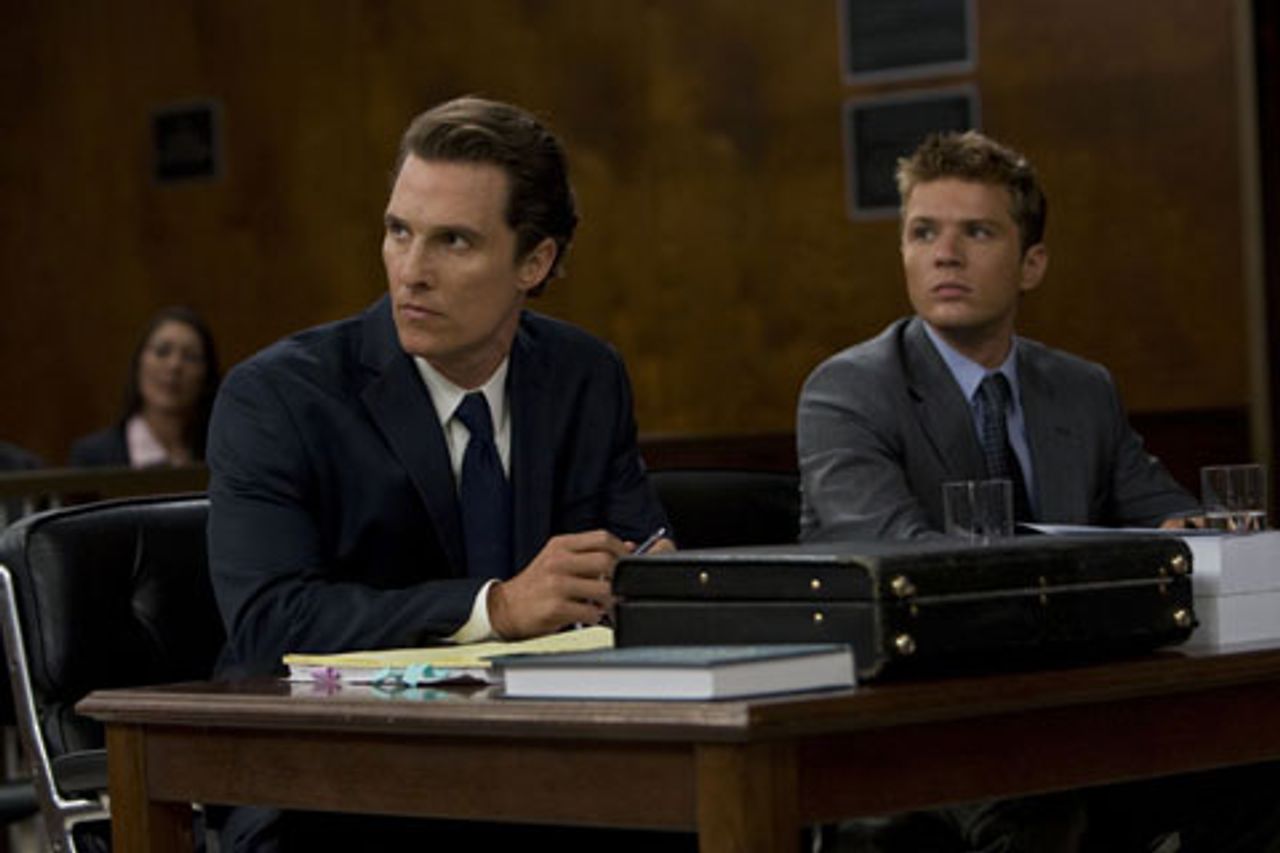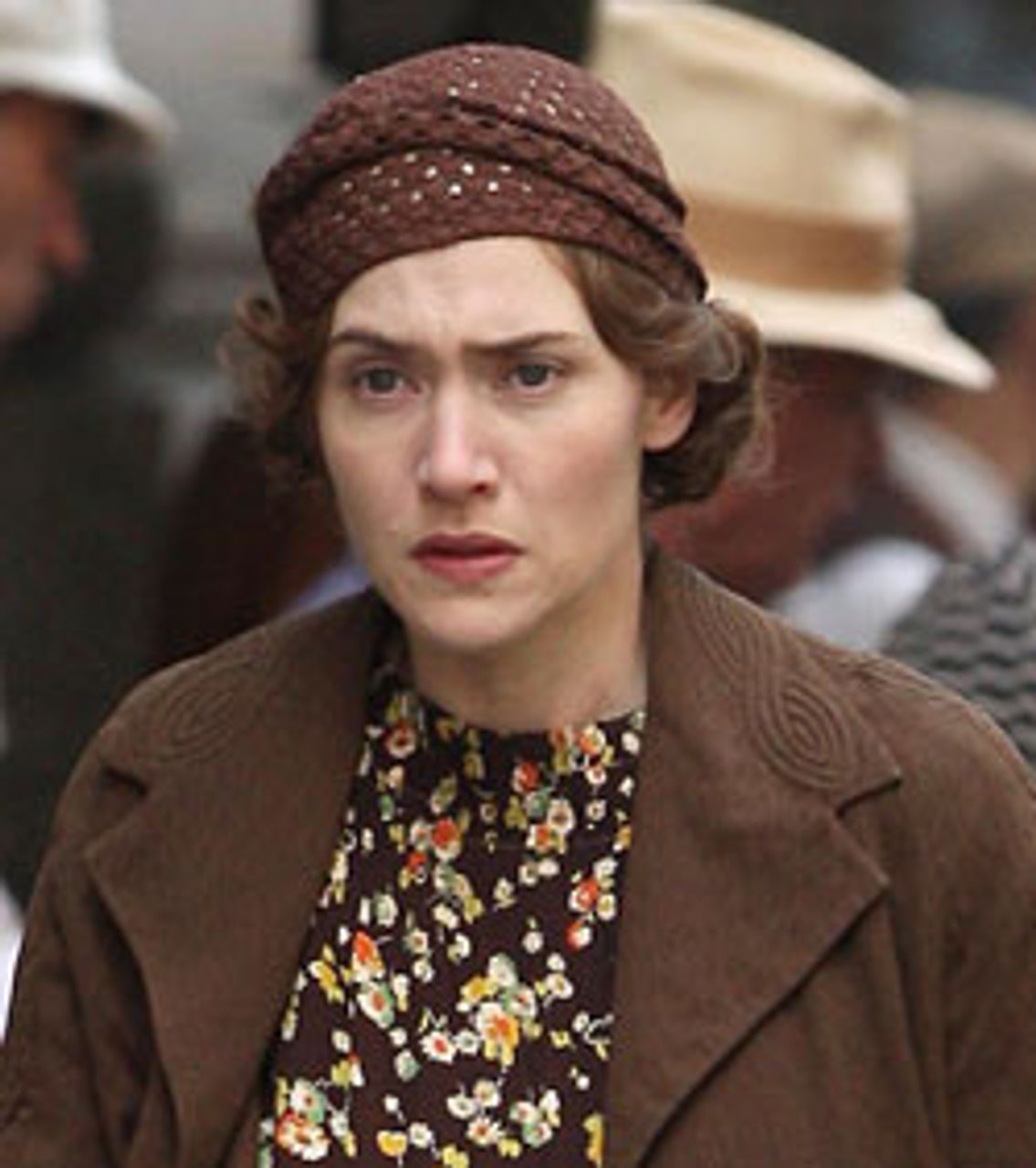Directed by Brad Furman, written by John Romano, based on the novel by Michael Connelly
 The Lincoln Lawyer
The Lincoln LawyerThe Lincoln Lawyer is a thriller-courtroom drama directed by Brad Furman (The Take) and adapted from the best-selling 2005 novel by veteran crime writer Michael Connelly. The film follows the general framework of the original relatively closely.
The story concerns a Los Angeles lawyer Mickey Haller (Matthew McConaughey), who conducts business from the Lincoln Town Car of the title. His usual clients are drug dealers, call girls, con artists and petty criminals of one kind or another.
Haller operates in what he himself describes, in Connelly’s work, as “the gray areas.” He has no interest in the innocence or guilt of his clients. In fact, he asserts early on that there is no client as frightening as an innocent one, because if a lawyer fails to prevent such an individual from going to prison, it will scar the attorney for life. Summing up, Connelly writes in his novel: “The law was not about truth [for Haller]. It was about negotiation, amelioration, manipulation.”
An apparently lucrative case falls into Haller’s lap. A very wealthy young man, Louis Roulet (Ryan Phillippe), stands accused of severely beating and threatening to rape a prostitute. Backed by his millionaire mother and her well-connected legal adviser, Roulet emphatically insists on his innocence and repudiates any plea bargain or possible agreement with the authorities.
Haller and his investigator, Frank Levin (William H. Macy), set to work looking into the details of the violent incident. It will not be giving away too much to reveal that their inquiries soon indicate that Roulet is hardly the innocent he claims to be. The immediate case appears to be linked to a previous one in which Haller convinced his client, a young Latino, to plead guilty to murder and accept a life sentence to avoid the death penalty.
In the end, Haller faces an apparently impossible dilemma. “I believed that I had one client,” explains the lawyer in the novel, “who was guilty of the murder another client was serving a life sentence for. I could not help one without hurting the other.” Both the book and film essentially hinge on Haller’s efforts to solve that legal-ethical problem.
Connelly writes intelligently, and not without sensitivity for the plight of many in the Los Angeles area. Of one 23-year-old black drug dealer, facing a number of years in prison, Haller (as narrator) comments: “I felt like he was another one who’d never had a shot at anything but thug life in the first place.… He had never been to a county beach, let alone outside Los Angeles. And now his first trip out would be on a bus with bars over the windows.”
Such sentiments, however, worthy as they may be, do not really drive the book. Something relatively conventional and predictable does that. One must say that, other than Haller’s unusual manner of doing business (out of the backseat of his automobile), there is not much that is fresh or innovative in the novel. The characters and settings are largely drawn from a familiar template.
How many times have we read about or seen a male protagonist whose marriage has broken up because of his emotional inattention or devotion to a career? How many such protagonists have faced an angry, bitter ex-spouse, as well as a neglected or semi-neglected child, and “learned an important lesson about taking responsibility”? Tiresomely, there is hardly a popular American novel or film without this element.
The Latino bail bondsman, the cynical cops, the junkie snitch, the affluent Beverly Hills real estate magnate—we have come across most of these numerous times before. Too much of the dialogue writes itself. There are clever twists and turns here, and genuinely convincing bits and pieces, but not enough of them to overcome the essentially formulaic character of the work as a whole.
Furman’s film version is also intelligently and competently put together, with adequate performances or better from McConaughey, Phillippe, Macy, Frances Fisher, Marisa Tomei, Josh Lucas, John Leguizamo and numerous others.
Unhappily, Tomei, a charming performer, as the ex-wife (and a prosecutor), with the child that Haller has neglected up until now, has little to do. Once the history of the relationship is sketched out for us, we are intended to fill in all sorts of obligatory details ourselves, concerning Haller’s perfidy, with the result that we actually know little about her or about the couple’s marriage.
Leguizamo too is playing a role, as the hyper-talkative, hustler bail bondsman that he could more or less perform in his sleep.
The Lincoln Lawyer wants to make evenhanded points at the expense of both defense lawyers and police-district attorneys. The former are chided for their lack of morals and willingness to go to any lengths to free their clients; the latter are taken to task for playing fast and loose with legal niceties, with cutting corners in the effort to put people away.
Haller’s troubled conscience about his impoverished, immigrant former client, now serving many years in prison, is more of an active, dynamic feature in the novel. The film becomes something more of a straightforward detective story, but the difference between the novel and film on that score is not that great, some of it the almost inevitable result of condensing and “streamlining” a 432-page novel.
The chief difficulty with the novel and film involves their social assumptions, revealing the degree to which the media-literary world, including its crime-writing component, has shifted in the direction of “law and order” and accommodation to the right-wing lurch by the political establishment.
The pivotal moment of both novel and movie comes when Haller explains that hitherto he thought that innocence was the most fearful thing he could encounter. Now, he has come to realize that it is “evil, pure evil,” referring to the villain of the piece. In truth, the drama comes to a dead halt at this moment and never recovers.
The resort to depicting irredeemably monstrous serial killers in American popular films and books is, first of all, the product of intellectual laziness. “Evil” is a religious conception, it has nothing to do with serious novel writing or filmmaking. The task of the literary-dramatic artist is to make sense of human behavior within the context of social development and psychology, not to create a special category of individuals excluded from that process. This is simply throwing in the towel and conceding that one is not up to the task. It is one of those “solutions” which settles matters by explaining nothing whatsoever.
And making a given character both “evil” and immeasurably rich does not improve matters. It may appeal to a certain populism not without its unhealthy aspects. The wealthy do not carry on as they do because they are evil, but because material circumstances dictate their conduct. (Not that that excuses anything. As the playwright Brecht noted, “They may have to be as they are, but they do not have to be.”)
Everyone’s life and character ought to be seriously explored and its most significant features brought to light. The human essence, we socialists understand, is the totality of social relationships. A criticism of the most monstrous behavior ought to involve a criticism of the monstrous social relationships that makes such behavior possible.
Connelly indicates that the crime novelist Raymond Chandler was an early inspiration. There is no reason to disbelieve him, and the influence is distantly evident, as it is on many contemporary and not-so-contemporary writers of mystery and detective stories.
But Chandler’s hero was not a policeman, the central figure in most of Connelly’s writing, or a relatively well-to-do lawyer. Along with many of the hardboiled writers of the 1930s, 1940s and 1950s, Chandler takes a generally jaundiced view of the authorities and the judicial system. The latter are ordinarily treated in a hostile manner—as the enemy, more or less.
 Kate Winslet in Mildred Pierce
Kate Winslet in Mildred PierceA reading of the best works of Dashiell Hammett, James M. Cain and others will confirm this view. Indeed, for a work that takes a distinctly different attitude toward social life in America, the ongoing HBO mini-series Mildred Pierce (directed by Todd Haynes), based on the Cain novel published in 1941, should be consulted. Although not a crime novel per se, Mildred Pierce’s tough-minded look at American realities and its insistence on economics as the driving force in life are welcome.
Unsurprisingly, the comfortable citizen in today’s world rarely discovers that crude material concerns (which are well taken care of in his or her case) are fundamental to an understanding of things. He or she has eyes on more profound questions, including humanity’s “dark side” and the existence of “pure evil.” This is pretty much nonsense in most cases.
Along with that has come an instinctive shift in the direction of favoring authority and the police, perceived, consciously or unconsciously, as a barrier against “the great [and threatening] unwashed,” with sweeping consequences. One has only to consider the disgusting number of television series and films about every level of law enforcement, including programs and movies that glorify the intelligence apparatus and torture.
Connelly is not simply a lover of law and order, and, as I indicated, goes out of his way to express sympathy with some of the very poor. However, his “evenhandedness” is itself a severe limitation and indeed, in the end, illusory. When he writes, before giving some facts and figures on crime, that “a considerable number of them [the population of LA] engage in criminal activity as a lifestyle choice,” he may simply being flippant, but the flippancy and approach reflect a social standpoint.
Connelly does not, on the other hand, provide statistics on police corruption and brutality, rampant in Los Angeles, or on the dire poverty afflicting millions in the area, nor on the viciousness and callousness of government policy that has condemned so many to such conditions.
The film version of The Lincoln Lawyer follows along in the author’s wake, making this or that interesting or amusing point, but leaving the bigger and more important realities of American life in the shade. The price for missing the social mark is a movie that leaves relatively little impact.
